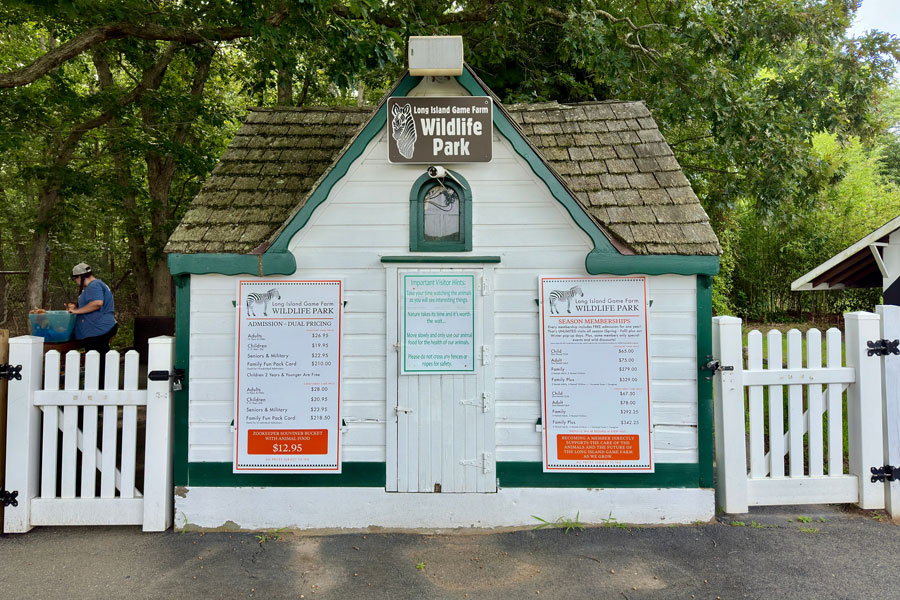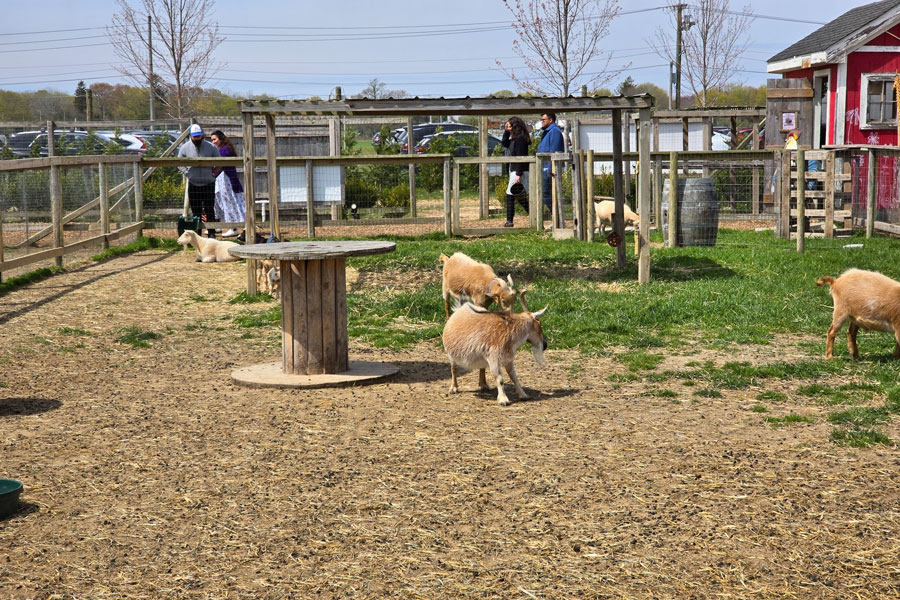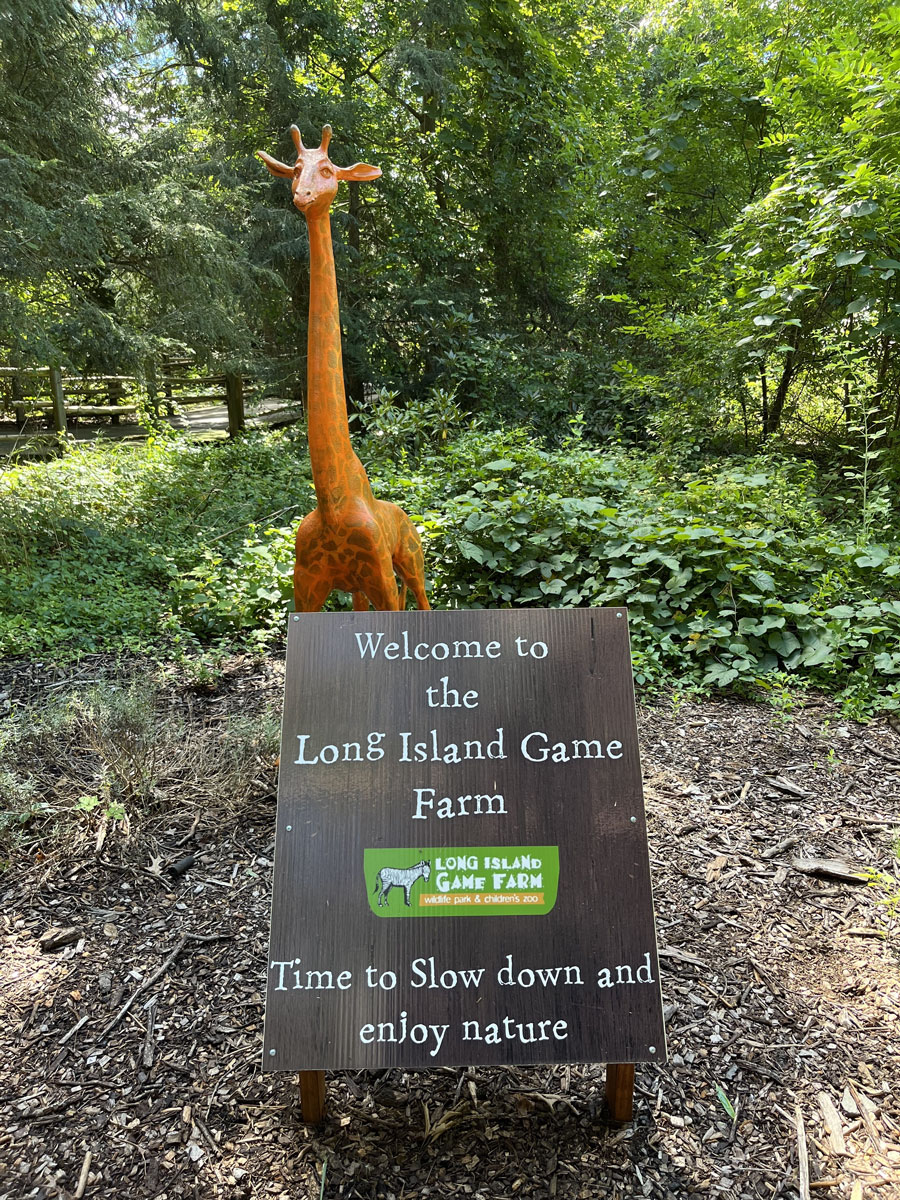Long Island Game Farm

Located at 489 Chapman Boulevard in Manorville, New York, the Long Island Game Farm Wildlife Park and Children’s Zoo is Long Island’s largest combined children’s zoo and wildlife park. The 26‑acre property functions as a sanctuary for more than 100 animals, many of which have been rescued, rehabilitated or re‑homed. Families visit to interact with exotic and domestic species, learn about wildlife, and participate in programs such as zookeeper chats, animal encounters and pony rides. The farm celebrated its 55th anniversary in 2025 and continues to add new attractions and community programs.
History and Timeline
- 1958 inspiration – A 1958 Saturday Evening Post cover by Norman Rockwell depicting a children’s zoo inspired Stanley Novak and his wife Diane to create a similar place on Long Island. In their spare time they researched animal species for a future zoo.
- 1969 – The Novaks purchased a 26‑acre hay and cattle farm in Manorville and began building enclosures such as Bambiland, a nursery for baby animals, Storyland and Old MacDonald’s Farm.
- Spring 1970 – The Long Island Game Farm opened as the first zoo on Long Island with about 125 animals. Early residents included buffalo, camels, chimpanzees, deer, goats, lambs and exotic birds.
- 1970s – Llamaland (1973), a sea‑lion show (1975) and the park’s first mechanical ride, a merry‑go‑round, debuted. The Animal Wonderland Theater followed in 1978.
- 1980s–1990s – A train encircled the grounds (1983), a tiger show replaced the sea‑lion show (1988), and new exhibits such as the sky slide were added.
- 1999 – Founder Stanley Novak died; his wife Diane and daughter Susan took over. Susan passed away in 2001 and their other daughter, Melinda Novak, returned to run the park full‑time. Under her leadership the farm shifted its focus to animals, nature and education, and rides were sold off.
- 2023–present – The farm launched the Foundation for Wildlife Sustainability, Inc., a nonprofit arm to support environmental and educational programs. A $568,000 JumpSMART grant enabled a renovation of the amphitheater and development of a universal‑access nature trail for wheelchairs and strollers. The amphitheater will host daytime animal shows and after‑hours concerts, while the new trail will convert unused land into a paved path with benches, plant markers and a labyrinth.

Animals & Exhibits
The Game Farm houses more than 100 animals ranging from domestic farm animals to exotic species. Key residents include:
- African serval cat (“Nala”) – Born in 2018 and re‑homed to the farm because servals can’t thrive as house pets.
- Alpacas & llamas – Social camelids known for their soft fleece and varied colors.
- American bison – Gentle grazers; bulls can weigh 1,600–2,000 pounds and run up to 38 mph.
- Camels – Guests can meet and feed camels; each adult can drink up to 30 gallons of water.
- Capybaras – Lilly and Dilly, the farm’s capybaras, are the world’s largest rodents and extremely social. Visitors can book capybara encounters at 11 a.m. and 1 p.m. or sign up for Capybara Yoga, which combines a yoga class with the animals.
- Wallabies & kangaroos – Wallaby encounters allow visitors to feed these marsupials and learn about their care.
- Other residents – Sicilian miniature donkeys, alpacas, peacocks, goats, sheep, African Sulcata tortoises, emus, lemurs, bison, foxes and more.

Experiences and Programs
The farm offers a variety of interactive experiences (extra cost in many cases):
- Animal encounters – Capybara feedings ($65/person, ages 5 +, 8 people max), pony encounters (30‑minute sessions teaching grooming and riding skills for children ages 5 +, weight limit 100 lb, max 4 children) and wallaby encounters (20‑minute program at 2 p.m., $65/person, ages 4 +). Each encounter requires a signed liability waiver and does not include park admission.
- Capybara Yoga – Yoga sessions with capybaras ($125/person including general admission). Participants must bring a yoga mat and sign a liability waiver.
- VIP Animal Tour – A private tour for up to four people that includes capybara and wallaby encounters, meeting monkeys, lemurs, zebras, camels, tortoises and other animals, plus bottle‑feeding yearling goats.
- Zookeeper Chats & daily feedings – Staff-led presentations teach visitors about animal behavior and conservation. The farm encourages guests to purchase approved feed and treats; outside food is prohibited.
- Pony Rides – Traditional pony rides are available for young children on scheduled days.
- Camp Zoo & educational programs – Seasonal camps and field‑trip programs introduce children to zoology, veterinary care and wildlife conservation. These programs often occur in collaboration with the Foundation for Wildlife Sustainability.
New Additions and Renovations
- Woodland Trail (2025) – Opened during the 55th‑anniversary season, this paved nature trail offers a calm environment with whimsical “Animal Antic” signs for walking groups. The trail is accessible to wheelchairs and strollers and prohibits bicycles; visitors must stay on the path for safety.
- Amphitheater & Universal Access Trail (Planned) – With funding from Suffolk County’s JumpSMART program, the farm plans to renovate its 300‑seat amphitheater and develop a universal access nature trail by Memorial Day 2024. The project includes a new stage, seating, picnic tables and potential after‑hours concerts. The universal access trail will turn an overgrown train path into a paved walk with a labyrinth, benches and a possible tower.
- Foundation for Wildlife Sustainability – Established in 2023, this nonprofit supports education, cultural and wellness programming at the park. Events include Wild Treasures Market, a monthly flea market, Family Fun Day (Aug 22), and Twilight in the Wild fundraising benefit.
Seasonal Events & Schedule (2025)
The park publishes a detailed calendar. Highlights include:
- Winter (Jan–Feb) – Closed to the public in January except for VIP tours; open weekends in February and daily during school break.
- Spring (Mar–Apr) – Open weekends in March; open Thursday–Sunday in April with special hours for school spring break and Easter. A ribbon‑cutting ceremony in early May launched the Woodland Trail and commemorated the 55th anniversary.
- Summer (May–Aug) – Daily hours 10 a.m.–5 p.m. beginning Memorial Day weekend. Weekly programs include Weekends with Nature Nick (interactive animal shows), Aim High Canines’ Stunt Dog Safari (Aug 1 – Sep 1), Songbird Sessions concert series and Pups in the Park on Labor Day weekend
islipbulletin.net. Capybara pool reveal took place July 18.
- Fall (Sep–Nov) – Post‑Labor Day hours 10 a.m.–4 p.m. weekdays and 10 a.m.–5 p.m. weekends. Special discounts include Grandparents Day (50% off general admission) and Senior Discount Day every Thursday. The farm is open on Columbus/Indigenous Peoples Day and Veterans Day; veterans receive free admission.
- Winter Holidays (Dec) – Open Saturdays and Sundays 10 a.m.–3 p.m. until Dec 21. “Santa on the Farm” events offer photos with Santa and holiday crafts.
Visiting Information
- Hours – Open daily and holidays; general hours are 10 a.m.–4 p.m. Thursday–Sunday (weather permitting). Summer hours extend to 5 p.m. and the park is closed on severe-weather days (check social media for updates).
- Admission (2025) – Adults (13–61): $26.95; Seniors 62 + & Military: $22.95; Children 3–12: $19.95; Children under 3: free; Family Fun Pack: $210. Tickets purchased with credit cards include a small convenience fee; parking is free.
- Amenities – Snack bar, souvenir stand, bathrooms and free parking. The park is mostly wheelchair accessible; only the Nursery and Bambiland areas have uneven terrain. Benches are provided for those needing rest. The new Woodland Trail further enhances accessibility.
- Policies – Guests may feed animals only with food purchased on site. Outside food for animals is prohibited; personal picnics are allowed but items such as BBQs, balloons, bikes, scooters, rollerblades, skateboards, pets and alcohol are forbidden. Pets are not permitted except for working service animals; emotional‑support animals are not allowed. Visitors should supervise children, avoid climbing fences or reaching into enclosures, wash hands before and after animal contact, and avoid eating while feeding animals.
Tips for Visitors
- Plan ahead – Reserve animal encounters or VIP tours in advance, as spaces are limited and require separate fees. Arrive early for scheduled shows and allow time to explore the Woodland Trail.
- Dress for the outdoors – Wear comfortable walking shoes; the park’s pathways are mostly unpaved except for the new Woodland Trail. Bring sunscreen and water in summer.
- Respect wildlife – The park’s animals are rescues or permanent residents; follow staff instructions and posted signs to ensure animal welfare and visitor safety.
- Watch the weather – The farm may close during rain or storms; check social media or call ahead for weather‑related updates.
The Long Island Game Farm Wildlife Park and Children’s Zoo has been educating and entertaining Long Islanders since 1970. From modest beginnings as a family‑run farm inspired by a Norman Rockwell painting to a modern wildlife park with over 100 animals, interactive encounters and accessible nature trails, the Game Farm continues to expand its offerings. Recent grants and the creation of the Foundation for Wildlife Sustainability promise new adventures – renovated amphitheater shows, universal‑access trails and community markets. Whether visiting for a capybara encounter, strolling the Woodland Trail or attending a live animal show, the Long Island Game Farm remains a unique destination for families and wildlife enthusiasts across Long Island.

